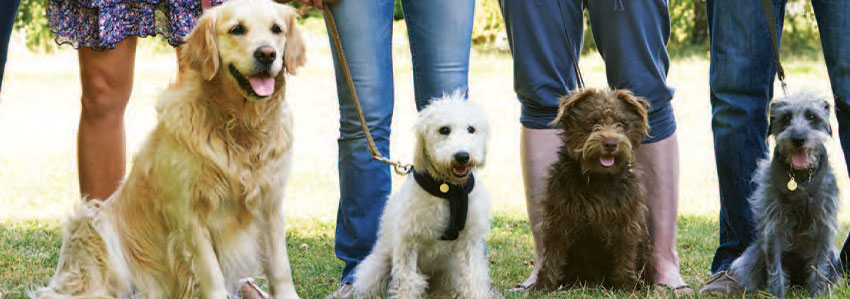
All God’s Creatures
A canine-therapy program brings great benefits to a Minnesota mission
by Kristi Rector
“No matter what you’re going through or what kind of day you are having, the dogs are always there to love on you,” said a participant in the canine therapy program at Union Gospel Mission Twin Cities (UGMTC) in Minnesota.
 Several of UGMTC’s departments recognized the need to offer nontraditional therapy for the unhoused population. They decided to start a canine-therapy program because “dogs have unconditional love for humans, which is something that UGMTC’s population (and all humans) benefits from greatly,” said Gina Landsee, a lead therapist and assistant clinical director at the men’s campus.
Several of UGMTC’s departments recognized the need to offer nontraditional therapy for the unhoused population. They decided to start a canine-therapy program because “dogs have unconditional love for humans, which is something that UGMTC’s population (and all humans) benefits from greatly,” said Gina Landsee, a lead therapist and assistant clinical director at the men’s campus.
UGMTC partnered with Canine Inspired Change (CIC) to work with their guests. The partnership began in the fall of 2019 and had to close temporarily due to COVID-19, but reopened in 2021. CIC provides curriculum and a lead teacher for each session. UGMTC and CIC have developed a strong relationship, and the same lead teacher has been working with the mission since the program started. “The lead teacher understands the struggles that UGMTC clients face and does an excellent job of engaging clients,” Gina said. In addition, several staff members got their own dogs trained as therapy dogs to be part of the CIC therapy team and participate in the canine therapy sessions. They come to UGMTC to engage with clients throughout the day.
“Anytime we have a trained therapy dog on campus, whoever is working with a dog gives themselves an extra 15 or 20 minutes to come into the building and to leave the building because we just stop and talk to people. We allow people to pet the dog, talk to the dog, engage with the dog because it really helps boost people’s morale,” Gina said.
Two paws up
Volunteer therapy teams of a dog and a human sign up for eight, one-hour sessions and come to UGMTC on a weekly basis. During the sessions, clients get to interact with the dogs, walk the dogs, learn the tricks each dog knows, support the dog through an obstacle course, and play canine-focused games.
“Anytime we have a trained therapy dog on campus, whoever is working with a dog gives themselves an extra 15 or 20 minutes to come into the building and to leave the building because we just stop and talk to people. We allow people to pet the dog, talk to the dog, engage with the dog because it really helps boost people’s morale.” —Gina Landsee
The dogs’ behavior allows for opportunities to teach clients coping skills. Gina explained, “Maybe the dog doesn’t want to go over the jump, and that parallels with how sometimes we don’t want to do those things that we’re supposed to do or we don’t always want to face those challenges that we have to do, but then we can do them over time with practice and learning.”
The dogs help clients develop patience and social skills such as regulating emotions. For example, “Our dogs aren’t doing what we want. Are we taking that on as our own? Or are we recognizing that a dog is a dog and they’re imperfect, just like we are as humans?” Gina said.
 UGMTC guests enjoy this unique hour of therapy every week and talk about how relaxing it is to interact with the dogs. “We do a check-in at the beginning of session and ask what number zero to 10 you are, with 10 being amazing, zero being terrible,” Gina said. They ask the same question at the end, and “the numbers almost always increase because of just spending that time engaging with the dogs.”
UGMTC guests enjoy this unique hour of therapy every week and talk about how relaxing it is to interact with the dogs. “We do a check-in at the beginning of session and ask what number zero to 10 you are, with 10 being amazing, zero being terrible,” Gina said. They ask the same question at the end, and “the numbers almost always increase because of just spending that time engaging with the dogs.”
Emotionally, the experience helps UGMTC clients develop patience, social skills, emotional regulation, and how to express kindness to each other during the eight weeks of canine therapy. Clients say that canine therapy is their favorite hour of the week. Along with supporting their growth and healing overall, some have said that canine therapy was helpful in their sobriety journey. “This was a big part of me moving on to the next step in AA,” one client said. “Every time I came [to canine therapy] I was calm and relaxed around and while working with the dog. This was a great experience.”
Another guest said they gained “patience with dogs and others. It showed me healthy outlets for my stress in life. And gave me an escape during weekdays that I look forward to.”
Interacting with the animals has physical benefits as well, including increased endorphins, reduced stress, reduced depression and anxiety symptoms, lower blood pressure, and better overall cardiovascular health.
Sights set on the future
The canine therapy program has been such a success that the biggest challenge has been not having enough availability to offer it to every interested client. But it has the potential to build upon itself.
In the last six months, CIC started taking on some of UGMTC clients and people who utilize the mission’s services as interns within their programs. Interns are able to then go with a therapy team — sometimes to UGMTC or to schools — to help with sessions.
Clients say that canine therapy is their favorite hour of the week. Along with supporting their growth and healing overall, some have said that canine therapy was helpful in their sobriety journey.
“It is unique to see clients start by participating in canine therapy and then move to volunteering or working with CIC,” Gina said. “They participate in an eight-week session at a different site. So typically, like at an elementary or middle school, there are a couple of these teachers who have two dogs. [UGMTC clients] basically are the handlers for one of those second dogs. And they do everything that a therapy team would do. So they support us in working with the dogs and doing all the things they have done in their own canine-therapy classes.”
Gina hopes that as the program continues, graduates would get their own dogs trained as therapy dogs “and then come back and volunteer here at the mission or in the community as a whole to kind of extend the program and our impact on people. I’ll be curious to see where we are in a couple of years when we have graduates coming back in to help lead these therapy sessions with their own dogs. That’s my vision for it.”
 Kristi is the former managing editor of Instigate and a freelance writer. She also owns KnotSense, a small business she started to provide calming support for people with sensory needs. Kristi and her family live in Colorado.
Kristi is the former managing editor of Instigate and a freelance writer. She also owns KnotSense, a small business she started to provide calming support for people with sensory needs. Kristi and her family live in Colorado.
This article originally appeared in the May/June issue of Instigate magazine. Please email editor@citygatenetwork.org for permission to reprint this article.